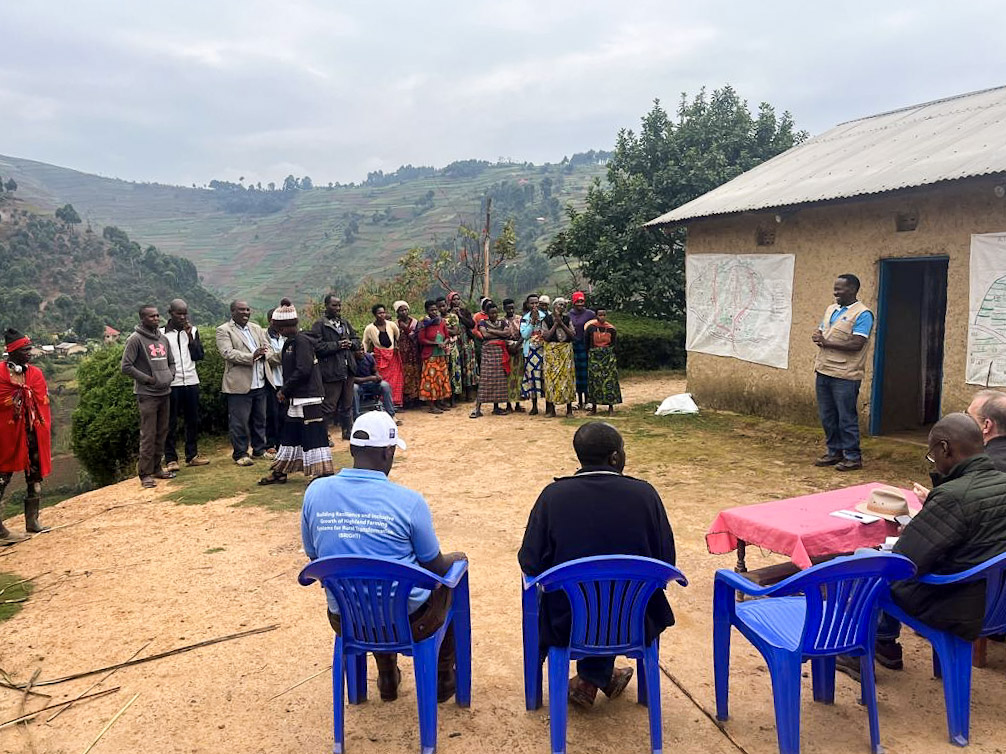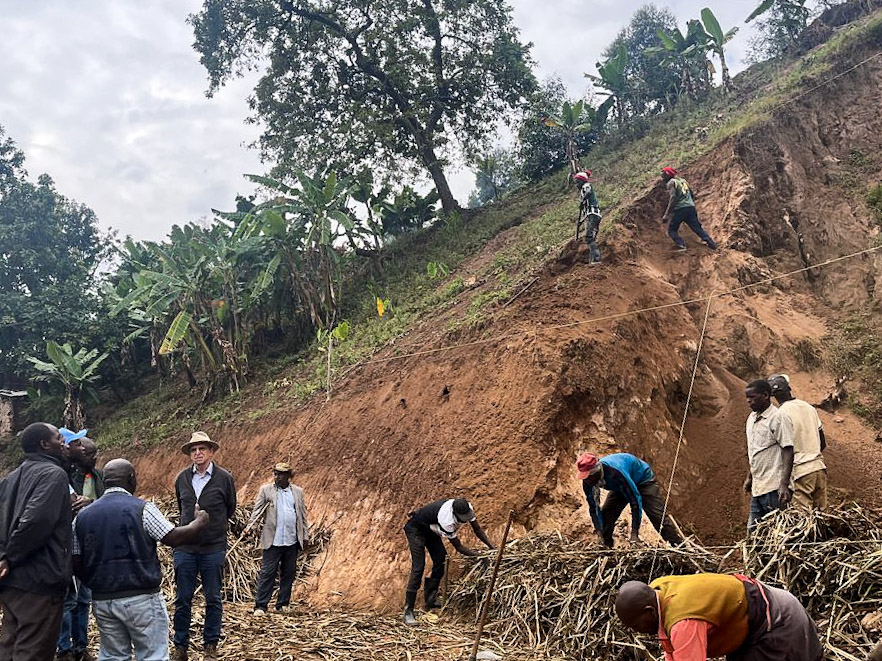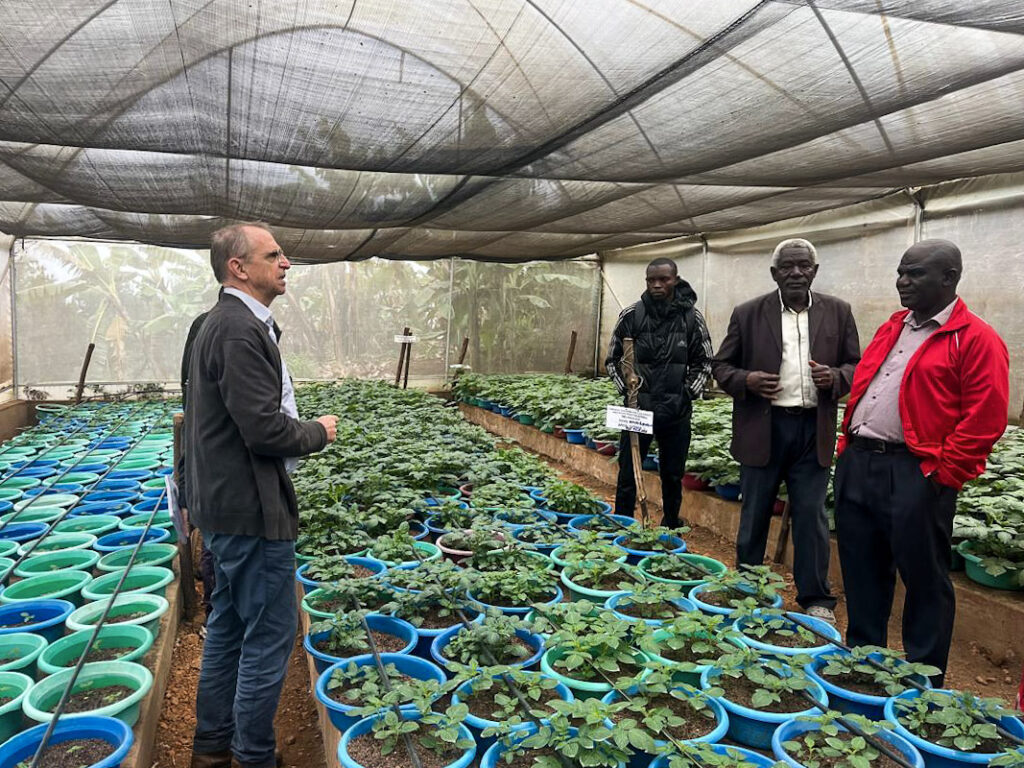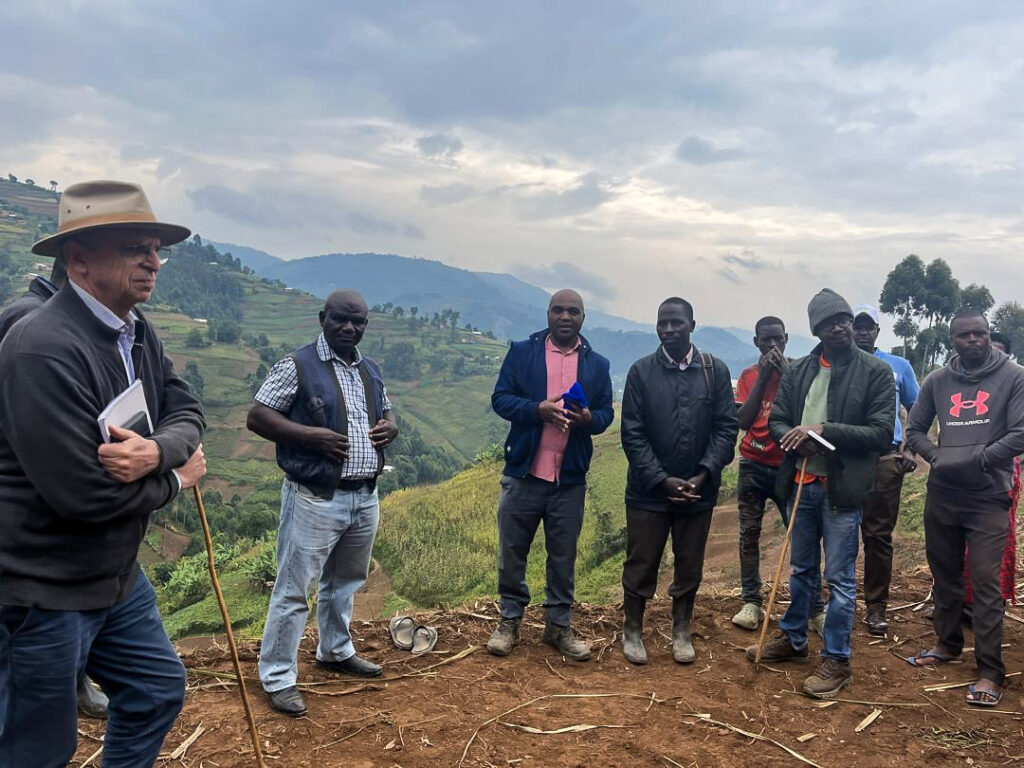
On July 15 and 17, representatives of the Embassy of the Kingdom of the Netherlands (EKN) in Uganda conducted a monitoring visit to Building Resilience and Inclusive Growth of Highland farming systems for rural Transformation (BRIGHT) project sites in Kabale and Rubanda districts, Kigezi Region.
The delegation, which included Hans Raadschilders, First Secretary of Food Security and Nutrition, and Josephat Byaruhanga, Senior Policy Officer of Food Security and Agribusiness, had the opportunity to engage directly with the BRIGHT project team, partners, and farmers to learn more about the impactful agricultural initiatives transforming Uganda’s highlands.
During the visit, discussions centered on topics such as the implementation of participatory integrated planning (PIP), highlighting the approach BRIGHT works through to establish agricultural growth.
The BRIGHT project continues to offer a full chain of support, providing farmer groups with access to improved agro-inputs, capacity building on good agronomic practices, market access for inputs and outputs, and access to affordable finance.
First on the agenda was visiting the Kitotera-Kanyamperere landscape, an area severely affected by soil erosion and mudslides, leaving deep gullies and making cultivation impossible.

BRIGHT carried out a vulnerability and suitability analysis and recommended terrace construction as well as established learning visits for 35 farmers and local leaders to the National Agricultural Research Organization (NARO) and the Kachwekano Zonal Agricultural Research and Development Institute (KaZARDI). The project has also provided tools for terrace digging and worked with local leaders to enact bylaws that promote sustainable land management practices.
While there, the team met with the community vision committee, which oversees joint planning, including the construction of bench terraces. So far, 8 out of a projected 15 acres have been terraced, helping prevent soil erosion and landslides. This has made the land more arable, which will lead to increased food and cash crop production while improving household food security and incomes.

Charles Byarugaba, founder of On Farm Clean Seed Potato Production, also met with the delegation at his innovative potato screen houses. With support from IFDC and the BRIGHT project, Charles has established two advanced potato screen houses with a combined capacity of 90,000 plantlets.
He has received support to formally register his agri-enterprise and strengthen its operations. Through targeted training on good agronomic practices and recordkeeping, as well as access to local seed businesses, he has expanded his market reach.
In the Kigezi potato hub, farmers traditionally relied on recycled seeds, which limited productivity. Charles now supplies certified potato seeds through his facility, enabling farmers to access high-quality seed and significantly improving household-level potato production and farmer incomes.
On the final day, EKN and BRIGHT visited the Nshajare Emikago group, a youth-led market-oriented group of 30 potato farmers. Nshajare Emikago has been supported by the BRIGHT project with market access for both inputs and outputs and connections to affordable agricultural financing. The group has also learned about the PIP approach, business development, governance, strategic planning, and good agronomic practices, including land preparation, seed selection, pest and disease management, bench terracing, harvesting, and post-harvest handling.

BRIGHT connected the farmer group to the Muko Cooperative, which supplies these youths with good quality agro-inputs, such as potato seeds and fertilizers, and purchases their produce at competitive prices. Through the cooperative, Nshajare Emikago has been able to access the high-demand Dutch potato variety Sagitta and sell its produce to Psalms Food Industries, which processes potatoes into chips, increasing the products’ value.
Nshajare Emikago has received 9 million Ugandan shillings (about U.S. $2,500) in affordable credit from the Muko Cooperative to reinvest in their agricultural enterprises. This support has empowered the group to grow stronger, improving the livelihoods of the smallholder farmers it serves.
As a result, the group has mobilized three additional farmer groups to form the Nshajare Multipurpose Cooperative, enhancing their collective production, bulking, financial access, bargaining power, and market reach. With support from the BRIGHT project, they have also established a low-cost ware potato storage — a key step toward reducing post-harvest losses and improving year-round supply.
At the end of the visit, the delegation commended BRIGHT and its partners for demonstrating strong community-driven action through implementation of the PIP approach. This integrated approach is unlocking sustainable growth, enhancing resilience, and driving inclusive agricultural development across Uganda’s highlands, especially among smallholder farmers.
The Building Resilience and Inclusive Growth for Highland Farming Systems for Rural Transformation (BRIGHT) project, funded by the Netherlands Ministry of Foreign Affairs through the Embassy of the Kingdom of the Netherlands, seeks to build the resilience capacity of farm households and farming systems in Uganda to increase income and food and nutrition security of all farmers and transform households from subsistence to more market-oriented in Kigezi, Mount Elgon, and Rwenzori regions. The project is being implemented by the International Fertilizer Development Center (IFDC) in cooperation with Agriterra, the Uganda Ministry of Agriculture, Animal Industry and Fisheries (MAAIF), the National Agricultural Research Organization (NARO), district local governments, and private sector partners.





